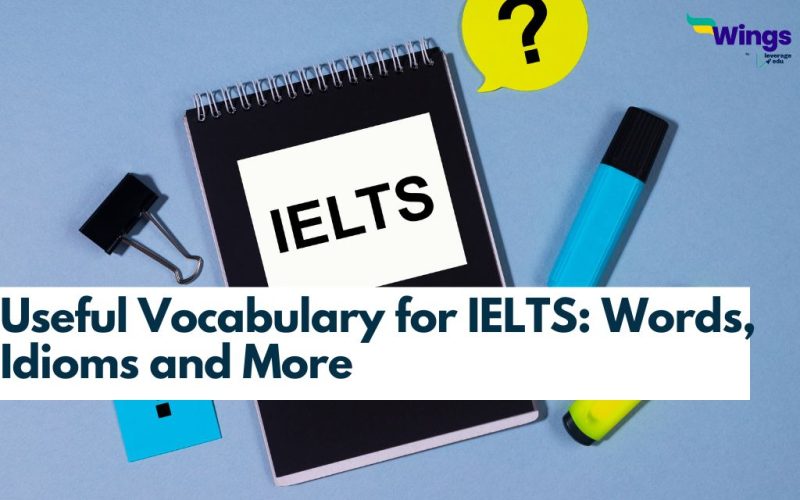The International English Language Testing System (IELTS) is a globally recognized test that measures the English Proficiency of non-native speakers. The IELTS exam assesses the language skills of candidates in reading, writing, listening, and speaking. Many students across the globe give IELTS to get admitted to their dream university or institution. But, the thing which many test takers lack is Vocabulary. In this blog, we will talk about the useful vocabulary for IELTS. We will discuss the types of vocabulary you should know and how to use it appropriately.
This Blog Includes:
Useful Vocabulary for IELTS Academic
One type of vocabulary that you should master is academic vocabulary. It refers to the language that is commonly used in academic settings, such as universities and research institutions. Using academic vocabulary in your writing can make it more sophisticated and professional. Here are some examples of academic vocabulary words:
| Vocabulary | Meaning |
| Synthesize | To produce something |
| Evaluate | To access, Judge |
| Paradigm | A pattern or model |
| Correlate | Have a mutual relationship or connection |
| Conjecture | Opinions formed on the basis of incomplete information |
| Hypothesize | To make a Hypothesis |
| Categorize | To put in a group or category |
Must Read: Tips to Improve Your Vocabulary For Best PTE Score
Useful Vocabulary for IELTS: Collocations
Collocations are words that typically go together. Using collocations in your writing can make it more natural and fluent. Here are some examples of collocations:
- Deeply concerned
- Utterly impossible
- Completely satisfied
- Heavy rain
- Strong coffee
- Rapidly increasing
Using these words together can make your preparation flow more smoothly and help you express your ideas more clearly.
Idioms for IELTS Exam
Idioms are phrases or expressions that have a figurative meaning. Using idioms in your IELTS vocabulary can make it more interesting and engaging. Using idioms can make your IELTS writing and speaking stand out, but be careful not to use them excessively, as it can make it appear forced or unnatural. Here are some examples of idioms:
| Idioms | Meaning |
| Cut to the chase | Come to the point |
| A dime a dozen | Common and not special |
| Hit the nail on the head | To be exactly right about something |
| A blessing in disguise | A bad thing that turns out to be good |
| Jump the gun | Act to hastily |
Linking Words for IELTS
These words or phrases connect your ideas and help your writing flow logically. Using linking words can help you organize your thoughts and make your speaking and writing more coherent. Using these words can help you structure and make it easier for the reader or listener to follow your ideas. Some examples of linking words are given below:
- However
- Nevertheless
- Consequently
- Therefore
- Additionally
- Furthermore
- In addition
FAQs
Improving vocabulary is an essential part while preparing for the IELTS exam. If you have an enriched vocabulary, you can use these words properly in a sentence.
You can incorporate idioms, collocations and linking words in your sentences to make them more effective. The student must also have knowledge of different types of vocabulary such as academic, technical etc.
IELTS is also known as International English Language Testing System. It is one of a popular English Proficiency Test that is required to pass for working or studying in abroad.
If you are aiming to appear for IELTS 2023, Then follow Leverage Edu‘s Leverage Live classes and our top trainers and strengthen your English score as well as your application so that you can secure your spot in your dream college. Fulfil your dreams of studying abroad with Leverage Edu, to get a free counselling session, reach us at 1800527130. Don’t forget to follow us on Facebook, Instagram, LinkedIn, and Twitter
 One app for all your study abroad needs
One app for all your study abroad needs















 45,000+ students realised their study abroad dream with us. Take the first step today.
45,000+ students realised their study abroad dream with us. Take the first step today.